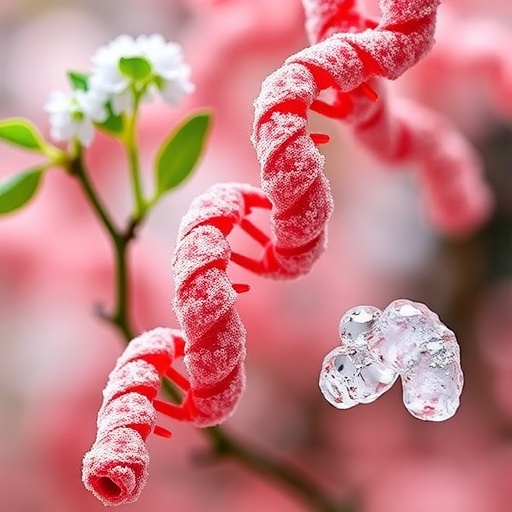In a groundbreaking study published in BMC Genomics, researchers Fu, Q., Pu, Y., Liu, J., and their colleagues have undertaken a comprehensive genome-wide analysis of the DnaJ gene family, particularly focusing on their expression profiles in potato plants subjected to salt stress. This pioneering work holds significant implications for agricultural biotechnology and plant genetics, as salt stress is a major environmental factor limiting crop yield and productivity worldwide.
At the core of this research is the DnaJ gene family, a group of proteins known as heat-shock proteins that play critical roles in protein folding and stress responses in plants. These proteins are crucial for maintaining cellular functions under adverse conditions. By analyzing the genome of potato plants, the researchers have uncovered a rich landscape of DnaJ gene family members, revealing insights into the evolutionary pathways and functional diversification of these essential proteins.
One of the key challenges in modern agriculture is managing the detrimental effects of salt stress on crops. Potatoes, being a staple food for millions, are particularly vulnerable to high salinity in the soil. When salinity levels rise, plants can experience cellular osmotic stress, leading to impaired growth and reduced yield. Understanding the molecular mechanisms underlying salt tolerance in potatoes is, therefore, paramount for developing resilient crop varieties that can thrive in challenging environments.
The researchers deployed advanced bioinformatics tools and methodologies to conduct a genome-wide identification of DnaJ genes in the potato genome. They meticulously scanned the genome for sequences encoding DnaJ proteins, identifying a substantial number of these genes. This comprehensive catalog becomes a valuable resource for further functional studies and highlights the complexity of gene regulation involved in stress responses.
As part of their exploration, the researchers also investigated the expression profiles of these DnaJ genes when subjected to salt stress. The findings revealed significant alterations in the expression levels, suggesting that certain members of the DnaJ gene family might serve as key players in the plant’s adaptive response to saline conditions. By profiling gene expression under varying degrees of salt stress, the scientists could pinpoint specific DnaJ genes that are upregulated, presenting targets for genetic engineering efforts aimed at enhancing salt tolerance in potatoes.
Additionally, the study examined the potential interaction networks between DnaJ proteins and other cellular components under stress conditions. The researchers utilized protein-protein interaction predictions to elucidate the roles of DnaJ proteins in broader signaling pathways related to abiotic stress responses. This approach has unveiled the intricate web of molecular interactions that underpin the plant’s ability to cope with high salinity, showcasing how DnaJ proteins function as part of a larger regulatory framework within the cell.
The implications of this research extend beyond the realm of basic science. By elucidating the role of the DnaJ gene family in salt stress responses, the authors provide critical insights that could inform breeding programs aimed at developing salt-tolerant potato varieties. This research aligns with the growing demand for sustainable agricultural practices capable of addressing food security challenges in the face of climate change.
Moreover, the integration of this knowledge into crop improvement strategies could facilitate the introduction of traits that confer resilience to salt stress, ultimately leading to enhanced potato yields in saline-prone regions. The potential to genetically engineer or selectively breed potato cultivars with enhanced DnaJ gene expression profiles presents a transformative opportunity for farmers facing the consequences of salinization.
The study’s results underscore the importance of multidisciplinary approaches in tackling complex agricultural issues. By merging genomic analysis, bioinformatics, and plant physiological insights, the team has laid the groundwork for future investigations into the functional roles of DnaJ genes under diverse environmental stressors. This integrative strategy can provide comprehensive solutions that address not only salt stress but also other abiotic stresses affecting crop production.
As researchers worldwide scrutinize genetic adaptations in plants, the findings of this study resonate with the urgency of developing sustainable solutions for agricultural resilience. By advancing our understanding of the genetic basis of salt tolerance, scientists can create a synergistic effect among various research initiatives aimed at enhancing crop adaptability amid changing climatic conditions.
The broader impacts of this research also reflect the pressing need for collaboration between scientists, agricultural practitioners, and policymakers. As innovative approaches emerge from the lab, translating these findings into real-world applications, particularly for farmers, will be crucial in ushering in a new era of sustainable agriculture. This alignment prioritizes genetic innovation as a means of safeguarding food security in a rapidly evolving environmental landscape.
In conclusion, the groundbreaking work undertaken by Fu, Q., Pu, Y., Liu, J., and their colleagues marks a pivotal moment in our understanding of the DnaJ gene family’s role in plant responses to salt stress. The findings not only contribute to the academic discourse on plant genetics and stress responses but also hold the promise of practical applications in potato breeding programs. As the study opens new avenues for research and application, it reinforces the imperative for a collaborative approach in addressing global food production challenges through scientific innovation.
Subject of Research: DnaJ gene family and their expression profiles under salt stress in potatoes.
Article Title: Genome-wide analysis of the DnaJ gene family and their expression profiles under salt stress in potato.
Article References:
Fu, Q., Pu, Y., Liu, J. et al. Genome-wide analysis of the DnaJ gene family and their expression profiles under salt stress in potato.
BMC Genomics 26, 758 (2025). https://doi.org/10.1186/s12864-025-11961-8
Image Credits: AI Generated
DOI: https://doi.org/10.1186/s12864-025-11961-8
Keywords: DnaJ gene family, potato, salt stress, gene expression, genome-wide analysis, abiotic stress, crop resilience, genetic engineering, plant physiology, sustainable agriculture.




